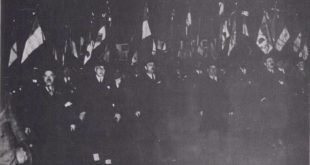UNLIKE Britain, France was not a highly industrialized country; its economy was fairly evenly divided between industry and farming. For this reason, the depression came to France later than it did to any of the democracies and its effect was less severe, but in no other democracy did communists and fascists play so large a part. For a time there was real danger that the French republic would be overthrown by the fascists and there were riots in the streets. One reason the fascists were so dangerous was that the French people were sharply divided in their political opinions. There …
Read More »The Election of 1936
As Roosevelt’s first term in office neared its end, many people in the United States — and in other countries — wondered if the New Deal could really solve America’s problems. More than that, they wondered if Americans would continue to follow the path of democracy. A wave of totalitarianism was sweeping the world; would it reach as far as America? There was no doubt that there were some Americans who supported Hitler and the Nazis. Members of the German-American Bund paraded in brown shirts and held a mass meeting in New York’s Madison Square Garden, but there were comparatively …
Read More »Fire in the Reichstag 1923 – 1933
DURING THE years that followed Hitler’s adventure in the Munich beer hall, ministers came and went in the German government. Among them were some able men, particularly Gustave Stresemann. He was foreign minister from 1923 until his death in 1929. His policy was to work out a way of getting along with Germany’s former enemies; so that Germany’s mighty industrial machine could operate again as it had in the past. This policy brought results. Inflation was stopped and foreign bankers made large loans to German industry. Smoke poured from the smokestacks of Germany’s efficiently run factories and the republic began …
Read More »“My Struggle”
When Hitler was discharged by the army in 1918, he found an altogether different Germany from the one he had known before the war. It was no longer ruled by a kaiser. The Socialists had taken over the government, but the Communists were active and calling for a revolution like that of Russia’s. After some fighting, the government succeeded in putting down the Communists. Their leaders, Karl Liebknecht and Rosa Luxemburg, were killed and the communist threat died down, at least for a time. In 1919, after elections, a coalition — a combination of various parties — led by the …
Read More »Stalin Succeeds Lenin 1924 – 1939
AFTER THE PEACE with Germany, Lenin had hoped for a breathing spell which would give him the chance to build up his backward country. Instead, there had been civil war and it left Russia worse off than ever. Although the government had taken over all the industries, they were producing very little. A way had to be found to give the people the necessities of life, especially food. To do this, Lenin proposed to put into effect something he called the New Economic Policy, soon known as NEP. While large industries would remain in the hands of the state, small …
Read More »



